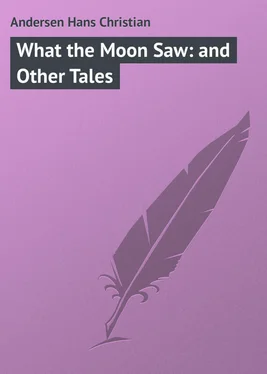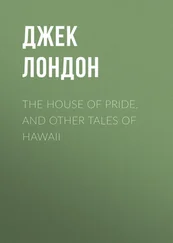Andersen Hans - What the Moon Saw - and Other Tales
Здесь есть возможность читать онлайн «Andersen Hans - What the Moon Saw - and Other Tales» — ознакомительный отрывок электронной книги совершенно бесплатно, а после прочтения отрывка купить полную версию. В некоторых случаях можно слушать аудио, скачать через торрент в формате fb2 и присутствует краткое содержание. Жанр: foreign_prose, на английском языке. Описание произведения, (предисловие) а так же отзывы посетителей доступны на портале библиотеки ЛибКат.
- Название:What the Moon Saw: and Other Tales
- Автор:
- Жанр:
- Год:неизвестен
- ISBN:нет данных
- Рейтинг книги:5 / 5. Голосов: 1
-
Избранное:Добавить в избранное
- Отзывы:
-
Ваша оценка:
- 100
- 1
- 2
- 3
- 4
- 5
What the Moon Saw: and Other Tales: краткое содержание, описание и аннотация
Предлагаем к чтению аннотацию, описание, краткое содержание или предисловие (зависит от того, что написал сам автор книги «What the Moon Saw: and Other Tales»). Если вы не нашли необходимую информацию о книге — напишите в комментариях, мы постараемся отыскать её.
What the Moon Saw: and Other Tales — читать онлайн ознакомительный отрывок
Ниже представлен текст книги, разбитый по страницам. Система сохранения места последней прочитанной страницы, позволяет с удобством читать онлайн бесплатно книгу «What the Moon Saw: and Other Tales», без необходимости каждый раз заново искать на чём Вы остановились. Поставьте закладку, и сможете в любой момент перейти на страницу, на которой закончили чтение.
Интервал:
Закладка:
"She never went out, except across the street to an old female friend; and in later years she did not even take this walk, for the old friend was dead. In her solitude my old maid was always busy at the window, which was adorned in summer with pretty flowers, and in winter with cress, grown upon felt. During the last months I saw her no more at the window, but she was still alive. I knew that, for I had not yet seen her begin the 'long journey,' of which she often spoke with her friend. 'Yes, yes,' she was in the habit of saying, 'when I come to die, I shall take a longer journey than I have made my whole life long. Our family vault is six miles from here. I shall be carried there, and shall sleep there among my family and relatives.' Last night a van stopped at the house. A coffin was carried out, and then I knew that she was dead. They placed straw round the coffin, and the van drove away. There slept the quiet old lady, who had not gone out of her house once for the last year. The van rolled out through the town-gate as briskly as if it were going for a pleasant excursion. On the high-road the pace was quicker yet. The coachman looked nervously round every now and then – I fancy he half expected to see her sitting on the coffin, in her yellow satin wrapper. And because he was startled, he foolishly lashed his horses, while he held the reins so tightly that the poor beasts were in a foam: they were young and fiery. A hare jumped across the road and startled them, and they fairly ran away. The old sober maiden, who had for years and years moved quietly round and round in a dull circle, was now, in death, rattled over stock and stone on the public highway. The coffin in its covering of straw tumbled out of the van, and was left on the high-road, while horses, coachman, and carriage flew past in wild career. The lark rose up carolling from the field, twittering her morning lay over the coffin, and presently perched upon it, picking with her beak at the straw covering, as though she would tear it up. The lark rose up again, singing gaily, and I withdrew behind the red morning clouds."
Eleventh Evening
"I will give you a picture of Pompeii," said the Moon. "I was in the suburb in the Street of Tombs, as they call it, where the fair monuments stand, in the spot where, ages ago, the merry youths, their temples bound with rosy wreaths, danced with the fair sisters of Laïs. Now, the stillness of death reigned around. German mercenaries, in the Neapolitan service, kept guard, played cards, and diced; and a troop of strangers from beyond the mountains came into the town, accompanied by a sentry. They wanted to see the city that had risen from the grave illumined by my beams; and I showed them the wheel-ruts in the streets paved with broad lava slabs; I showed them the names on the doors, and the signs that hung there yet: they saw in the little courtyard the basins of the fountains, ornamented with shells; but no jet of water gushed upwards, no songs sounded forth from the richly-painted chambers, where the bronze dog kept the door.
"It was the City of the Dead; only Vesuvius thundered forth his everlasting hymn, each separate verse of which is called by men an eruption. We went to the temple of Venus, built of snow-white marble, with its high altar in front of the broad steps, and the weeping willows sprouting freshly forth among the pillars. The air was transparent and blue, and black Vesuvius formed the background, with fire ever shooting forth from it, like the stem of the pine tree. Above it stretched the smoky cloud in the silence of the night, like the crown of the pine, but in a blood-red illumination. Among the company was a lady singer, a real and great singer. I have witnessed the homage paid to her in the greatest cities of Europe. When they came to the tragic theatre, they all sat down on the amphitheatre steps, and thus a small part of the house was occupied by an audience, as it had been many centuries ago. The stage still stood unchanged, with its walled side-scenes, and the two arches in the background, through which the beholders saw the same scene that had been exhibited in the old times – a scene painted by nature herself, namely, the mountains between Sorento and Amalfi. The singer gaily mounted the ancient stage, and sang. The place inspired her, and she reminded me of a wild Arab horse, that rushes headlong on with snorting nostrils and flying mane – her song was so light and yet so firm. Anon I thought of the mourning mother beneath the cross at Golgotha, so deep was the expression of pain. And, just as it had done thousands of years ago, the sound of applause and delight now filled the theatre. 'Happy, gifted creature!' all the hearers exclaimed. Five minutes more, and the stage was empty, the company had vanished, and not a sound more was heard – all were gone. But the ruins stood unchanged, as they will stand when centuries shall have gone by, and when none shall know of the momentary applause and of the triumph of the fair songstress; when all will be forgotten and gone, and even for me this hour will be but a dream of the past."
Twelfth Evening
"I looked through the windows of an editor's house," said the Moon. "It was somewhere in Germany. I saw handsome furniture, many books, and a chaos of newspapers. Several young men were present: the editor himself stood at his desk, and two little books, both by young authors, were to be noticed. 'This one has been sent to me,' said he. 'I have not read it yet; what think you of the contents?' 'Oh,' said the person addressed – he was a poet himself – 'it is good enough; a little broad, certainly; but, you see, the author is still young. The verses might be better, to be sure; the thoughts are sound, though there is certainly a good deal of commonplace among them. But what will you have? You can't be always getting something new. That he'll turn out anything great I don't believe, but you may safely praise him. He is well read, a remarkable Oriental scholar, and has a good judgment. It was he who wrote that nice review of my 'Reflections on Domestic Life.' We must be lenient towards the young man.'
"'But he is a complete hack!' objected another of the gentlemen. 'Nothing is worse in poetry than mediocrity, and he certainly does not go beyond this.'
"'Poor fellow,' observed a third, 'and his aunt is so happy about him. It was she, Mr. Editor, who got together so many subscribers for your last translation.'
"'Ah, the good woman! Well, I have noticed the book briefly. Undoubted talent – a welcome offering – a flower in the garden of poetry – prettily brought out – and so on. But this other book – I suppose the author expects me to purchase it? I hear it is praised. He has genius, certainly; don't you think so?'
"'Yes, all the world declares as much,' replied the poet, 'but it has turned out rather wildly. The punctuation of the book, in particular, is very eccentric.'
"'It will be good for him if we pull him to pieces, and anger him a little, otherwise he will get too good an opinion of himself.'
"'But that would be unfair,' objected the fourth. 'Let us not carp at little faults, but rejoice over the real and abundant good that we find here: he surpasses all the rest.'
"'Not so. If he is a true genius, he can bear the sharp voice of censure. There are people enough to praise him. Don't let us quite turn his head.'
"'Decided talent,' wrote the editor, 'with the usual carelessness. That he can write incorrect verses may be seen in page 25, where there are two false quantities. We recommend him to study the ancients, etc.'
"I went away," continued the Moon, "and looked through the windows in the aunt's house. There sat the be-praised poet, the tame one; all the guests paid homage to him, and he was happy.
"I sought the other poet out, the wild one; him also I found in a great assembly at his patron's, where the tame poet's book was being discussed.
Читать дальшеИнтервал:
Закладка:
Похожие книги на «What the Moon Saw: and Other Tales»
Представляем Вашему вниманию похожие книги на «What the Moon Saw: and Other Tales» списком для выбора. Мы отобрали схожую по названию и смыслу литературу в надежде предоставить читателям больше вариантов отыскать новые, интересные, ещё непрочитанные произведения.
Обсуждение, отзывы о книге «What the Moon Saw: and Other Tales» и просто собственные мнения читателей. Оставьте ваши комментарии, напишите, что Вы думаете о произведении, его смысле или главных героях. Укажите что конкретно понравилось, а что нет, и почему Вы так считаете.












